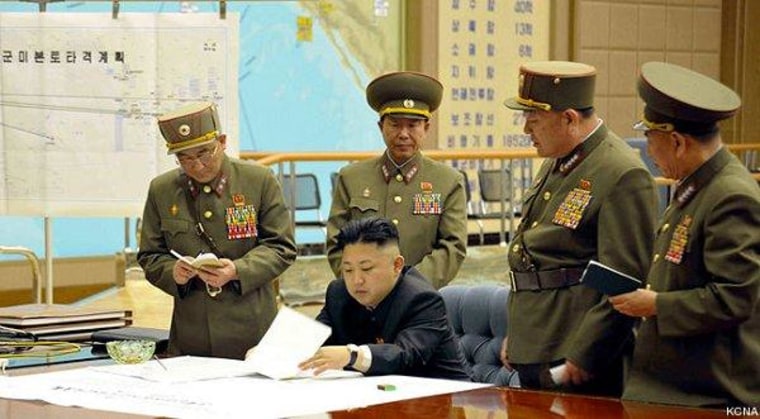It's difficult to say with confidence whether, and to what extent, to take seriously North Korea's latest tantrum. The dictatorship's belligerent saber rattling will wax and wane, and often coincides with new South Korean leadership, and the recent escalations may be inconsequential posturing.
It'd be irresponsible, however, to dismiss the seriousness of recent events. In the wake of North Korea's most recent nuclear test, international tensions have spiraled quickly, including an announcement from Kim Jong-un late Friday that his country is now in a "state of war" -- an ominous declaration with an ambiguous meaning.
It's against this backdrop that Ari Fleischer, a prominent Republican voice and former press secretary for the Bush/Cheney White House, seemed a little defensive the other night, worrying that President Obama might "blame George Bush" for the burgeoning crisis.
Why would Fleischer be defensive about this? Perhaps because the Bush/Cheney administration let North Korea get nuclear weapons.
The Clinton administration negotiated an Agreed Framework with North Korea in 1994, which was successful in "bottling up North Korea's nuclear program for eight years," and which eased the crisis on the peninsula. In March 2001, Colin Powell said Bush/Cheney would pick up where Clinton/Gore had left off.
The Bush White House immediately rebuked Powell, forced him to walk back his position, and rejected the Agreed Framework. Kim Jong-il hoped for a new round of negotiations, but the Republican administration refused. As Dick Cheney once put it, "We don't negotiate with evil -- we defeat it." The Republican president instead added North Korea to an "axis of evil."
By 2002, North Korea unlocked its fuel rods, kicked out international weapons inspectors, and became more aggressive in pursuing a nuclear weapons program. In response, "Bush didn't take military action, he didn't call for sanctions, nor did he try diplomacy" -- instead focusing his energies on selling the United States on the need for a disastrous war in Iraq.
Indeed, Bush argued at the time that the U.S. had to hurry up and invade Iraq before it could acquire nuclear weapons, effectively telling North Korea that the way to avoid an invasion was to advance its nuclear program as quickly as possible -- which it did.
As a result, North Korea became a nuclear state on Bush's watch, and paid no price for its actions. The world is left with an isolated dictatorship, craving attention, and playing with the most dangerous weapons the world has ever known.
No wonder Ari Fleischer is worried about his former boss getting blamed for another foreign policy fiasco.
